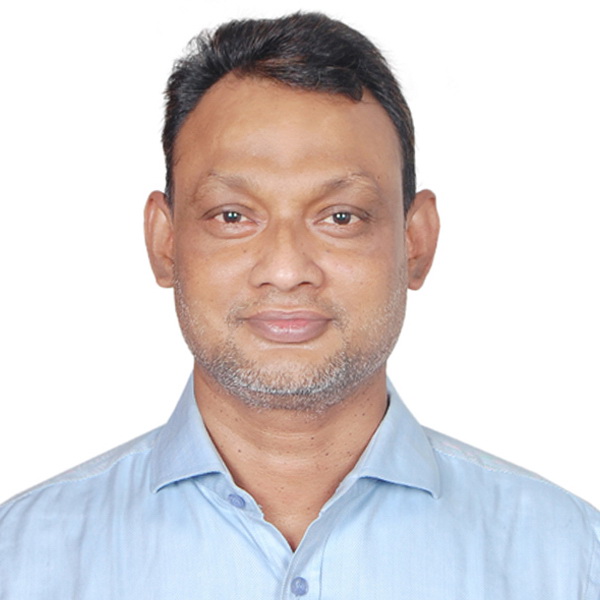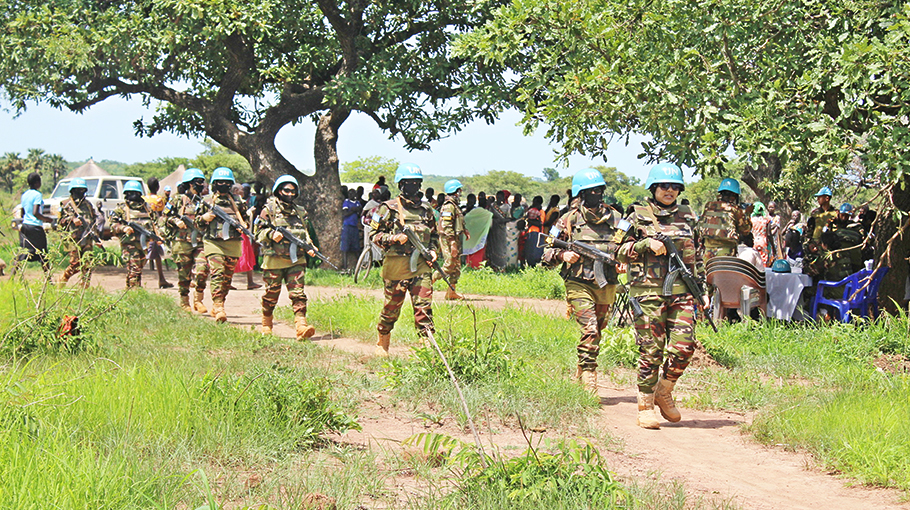Bangladesh peacekeepers’ role in South Sudan glorified
Local women hail BANBATT-6 for gender patrol

The engagement team of BANBATT-6 under the United Nations Mission in South Sudan (UNMISS), regularly organises gender patrols to make sure that the tasks listed in the mandate are carried out.
They have three main responsibilities during these patrols: protection of civilians, monitoring and looking into human rights, and establishing favourable conditions for the distribution of humanitarian aid. Through these patrols, the engagement team aims at connecting with South Sudan's female population. They disseminate broad information about hygiene and health, cleanliness, fundamental education, first aid, various forms of training, etc. During these patrols, they also offer fundamental life-saving medical care, if necessary.
Overall, through these patrols, the engagement team gets to know the local women, hears about their struggles, joys, and triumphs, and tries to relate to them. The engagement team also inspires South Sudanese women to go up and integrate into society by serving as a personal model of female empowerment. As a routine, the engagement team of BANBATT-6 conducted another similar gender patrol in the Kawajena in South Sudan recently.
Captain Sonar Tori, the commander of the female engagement team, conducted the patrol under the direction of Gender Adviser Major Khan Udaya Nuri Prana.
The engagement team made an effort to speak with many women and kids as they could in that region. They visited each home to see how they lived and to see the facilities for their health and cleanliness. The engagement team made every effort to get in touch with them and find out whether or not they were being subjected to any violations of human rights. They also urged the local women to participate in society's decision-making, recognise their rights, spot injustices, and speak out against them.
Colonel Mohammad Shafkat-ul-Islam, Contingent Commander of BANBAT-6, said that Bangladesh is at the top of the UN peacekeeping mission. To maintain this honour and dignity of the country, apart from military patrols and other operational activities, BANBAT-6 has been conducting various social and humanitarian activities under the Civil Military Cooperation programme.
In addition to ensuring safety and providing humanitarian services,the local people have accepted the peacekeepers of Bangladesh as absolute friends.
According to Inter Services Public Relation Directorate (ISPR) Director Lt Colonel Abu Hayder Mohammad Rasheluzzaman, currently 7,436 Bangladeshi peacekeepers are working in various countries of the world.
Among them, 6,043 from Bangladesh Army, 359 from Bangladesh Navy, 522 from Bangladesh Air Force and 512 from Bangladesh Police.
Around 15% of them are female peacekeepers, he said, adding that more than 5% women peacekeepers have been deployed at a contingent level in UN Peacekeeping missions .
Lt Colonel Abu Hayder Mohammad Rasheluzzaman further said, we are working to deploy more women in UN peacekeeping missions in future.
Bangladesh’s contribution to the UN Peacekeeping is a story of glory and success. The footprints of Bangladeshi peacekeepers are now evident in almost all the troubled areas of the world. Bangladesh had been the leading troops contributing country in 2011, 2014 and 2015 and 2021,the head of the ISPR further said.
Pasquale Madut, Payam Administrator and Aken Uchiala, Local Chief of Adanpur, welcomed the patrol team heartily. The engagement team of BANBATT-6 handed over a handsome amount of high yielding vegetable seeds to the local women and arranged a discussion session with them. In that session different issues regarding modern agriculture, care and management of crops, scientific management of diseases and pests of crops were discussed.
Senior Medical Officer of BANBATT-6 Major Khan Udaya Nuri Prana provided medical support to the underprivileged women and children of Adanpur of Kawajena. She also advised the patients about various health related issues, personal health and hygiene, prevention and care of different diseases.
The gender patrol also gave local mothers and children in that area necessary hygiene and sanitary items when they came across them. To aid the kids' recreational activities, they also distributed a few sports-related goods to them.
About the activities of the gender engagement team, Kawajena Payam Administrator Pasquale Madut said the importance of women in the peace process of South Sudan cannot be overstated. Women have played a crucial role in advocating for peace and reconciliation, and their participation has been essential to the success of the peace process. In South Sudan, women have been disproportionately affected by the decades-long conflict, which has resulted in displacement, violence, and sexual abuse. Despite these challenges, women have been at the forefront of efforts to promote peace and reconciliation in the country.
Women have organized themselves into various groups and networks to advocate for peace and to ensure that their voices are heard in the peace process. These groups have pushed for increased participation of women in the peace negotiations and have called for gender-sensitive peace agreements that address the specific needs of women and girls.
BANBATT-6 engagement team platoon Commander Captain Sonar Tori discussed women's empowerment which is an important issue in South Sudan, where women have historically faced significant challenges in accessing education, health care, and economic opportunities.
Referring to some strategies that can help to increase women's empowerment in South Sudan, she said, education is a key factor in promoting women's empowerment. Providing girls with access to education can help them to develop skills and knowledge that can improve their economic prospects, increase their decision-making power, and promote gender equality.
According to Captain Sonar Tori , legal and policy reforms can help to promote women's rights and improve their access to education, health care, and economic opportunities.
Captain Sonar Tori, engagement team platoon commander of BANBATT-6 also said, there are several reasons why female community engagement is particularly important in South Sudan. First, women make up a significant proportion of the population in South Sudan, and their participation is critical to achieving sustainable development. Second, women's involvement can help to ensure that policies and programmes are designed to meet the needs of all members of the community.
Finally, women's participation can help to promote gender equality and address the challenges of gender-based violence and other forms of discrimination that women face. In conclusion, female community engagement is critical for the development and stability of South Sudan. Women have played a vital role in community mobilization, advocacy, and leadership, and their involvement is essential for achieving sustainable development.
BANBATT-6 gender adviser Major Udaya said a multi-faceted approach that addresses the various barriers to women's empowerment is needed to make progress in South Sudan. By providing education, economic opportunities, legal and policy reforms, community engagement, and health care support, it is possible to promote the empowerment of women in the country.
Urging to promote transparency, she further said, transparency is crucial to building trust and fostering community engagement. Make sure that information about projects, programs, and initiatives is readily available to the community. This can be done by holding regular meetings, providing updates through social media, and creating accessible information centers.
According to BANBATT-6 gender adviser Major Udaya, collaboration is key to community engagement. Work with community leaders and organizations to identify common goals and priorities, and develop partnerships to achieve them.
By working together, you can build a stronger, more engaged community, she continued.
Aken Uchiala, Local Chief of Adanpur of Kawajena in South Sudan said, overall increasing community engagement in South Sudan requires a long-term commitment to building trust, promoting transparency, and encouraging participation. By taking these steps, we can help create a stronger, more resilient community that is better equipped to address the challenges it faces.
The engagement team was able to successfully connect with the people of Kawajena. They not only improved relations between the locals and UNMISS, but they also completed a number of specified responsibilities. The engagement team was able to obtain some data that assisted BANBATT in comprehending the local situation there. Because of the relationship they built, they expect that in the future, local women in this region will feel more at ease approaching them with gender-related difficulties. Most importantly, the Engagement team was successful in inspiring and influencing neighbourhood women to promote women's empowerment. The local people expressed their sincere gratitude to the engagement team. The engagement team believed that in response to this patrol, the community would be more likely to view BANBATT-6 positively and South Sudan's peace building efforts would advance.


